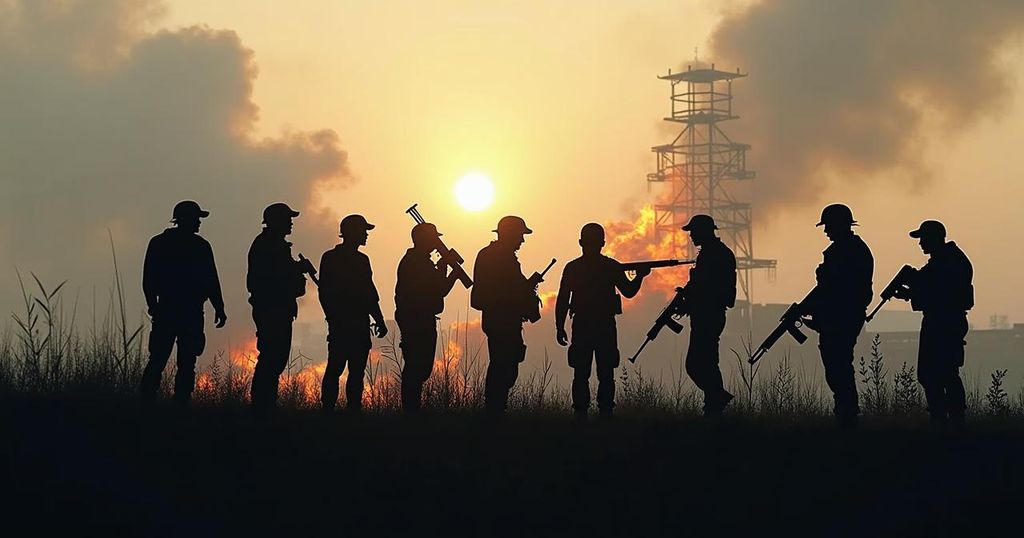The Wagner Group, led by Yevgeny Prigozhin, has declared an armed rebellion against the Russian military, capturing key installations and downing helicopters. The unrest has triggered concerns over potential ramifications for Russia’s military effectiveness in the ongoing Ukraine war, amid escalating tensions between the mercenaries and government forces. Analysts suggest that a withdrawal of Wagner troops could signify a significant loss for Russia’s offensive in Ukraine.
In recent developments, the Wagner Group, led by their chief Yevgeny Prigozhin, has initiated an armed rebellion against the Russian military, citing accusations of unprovoked attacks against its personnel. Reports indicate that Wagner forces have successfully seized two Army headquarters and downed three Russian helicopters, plunging Russia into a state of uncertainty amidst ongoing Ukrainian counteroffensives and increasing Western pushback. This civil unrest follows the Ministry of Defense’s demand that all mercenaries, including Wagner troops, sign formal contracts, a move that Prigozhin perceives as a threat to his authority and influence. The Wagner Group’s unrest is not a sudden occurrence; tensions have been mounting over recent months. Prigozhin’s allegations highlight logistical issues, including claims that his forces faced ammunition shortages exacerbated by the Defense Ministry’s alleged attacks on Wagner installations. He remarked on the tragic losses of Wagner soldiers, declaring, “These are someone’s fathers and someone’s sons… The scum that doesn’t give us ammunition will eat their guts in hell.” Further noting the challenges faced by his troops, Prigozhin stated, “Wagner ran out of resources to advance in early April… our losses are growing exponentially every day.” With mounting pressure and little hope of peaceful reconciliation, the Wagner Group has promised a counter-offensive, leading to questions about the potential implications of this internal strife on the broader military conflict in Ukraine. Analysts have expressed concerns that if Wagner forces withdraw from their positions, it could signify a grave setback for Russia’s ongoing military operations. Yohann Michel, a research analyst with the International Institute for Strategic Studies, indicated this notion, stating, “If he’s removed from the front line… I think we can say it is the end of this phase of the offensive for Russia.” As the situation escalates, U.S. officials have warned that Yevgeny Prigozhin’s departure could jeopardize Russian military effectiveness, despite recognizing that his leadership has created significant challenges for the Kremlin. “There is nobody as effective as him,” a U.S. official noted. Recent reports also indicate that Wagner mercenaries are advancing northward towards Moscow, with sights on changing the military leadership. Prigozhin has openly criticized President Vladimir Putin, labeling them as ‘traitors’ and alluding to potential leadership changes in Russia. The chaos surrounding the Wagner Group’s rebellion raises critical questions about Russia’s stability and its ongoing military endeavors in Ukraine. Should the unrest continue unabated, it could precipitate profound changes within Russian military strategy and governance as the country grapples with both external military challenges and emerging internal conflicts.
The Wagner Group is a paramilitary organization that has operated in various conflict zones, providing military support in exchange for financial incentives. Its relationship with the Russian government, particularly with President Vladimir Putin, has been complex, often acting as an extension of Russian military efforts while simultaneously maintaining a degree of independence. The current rebellion has emerged against a backdrop of escalating tensions between the Wagner Group and the Russian Ministry of Defense, primarily over the control and command of mercenary operations. This schism illustrates broader weaknesses within the Russian military framework, highlighting challenges as the country faces a sustained conflict in Ukraine and external pressures from Western allies.
In conclusion, the rebellion led by the Wagner Group poses significant challenges for Russia’s military coherence and its strategy in the ongoing conflict in Ukraine. As Prigozhin’s forces confront the Russian military’s leadership, the internal dissent threatens to alter the course of the war. The outcome of this rebellion may exert a substantial impact on both Russia’s military operations in Ukraine and the political stability of the regime under President Putin. Immediate observer attention is warranted as the developments unfold, given their potential to reshape Russia’s military landscape and response to increasing Ukrainian resistance.
Original Source: www.livemint.com






